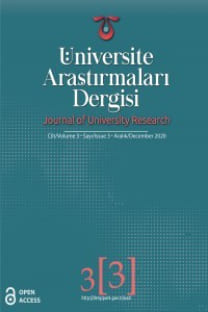Türkiye’de Uygulamalı Sosyal Bilim Sorunsalı: Uygulamalı Psikoloji Ekseninde Bir Değerlendirme
Bu çalışma, sosyal bilimlerin ülkemiz coğrafyasında Psikoloji bilimi başta olmak üzere üniversitelerin eğitim ve politikalar bağlamında yaşadığı uygulama sorunlarını, uygulama temelli bir bilim anlayışının oluşturulmasına engel teşkil eden süreç ve dinamikleri ve buna karşı üniversitelerin bir sorumluluk hassasiyetiyle üstlenmesi beklenen rolleri konu almaktadır. Literatürde uygulamalı sosyal bilimler, toplumsal alanlara yönelik ve stajla beraber uygulama eğitimlerinin verildiği psikoloji ve psikolojik danışmanlık, sosyoloji, sosyal hizmetler, siyaset bilimi, ekonomi, antropoloji, arabuluculuk ve demografi gibi bilim ve çalışma alanlarını kapsamaktadır. Çalışmada, Türkiye bağlamında, sosyal bilimlerin yaşadığı ithal kavramsallaşma sorununu ve bilimsel altyapıdaki azgelişmiş uygulama dinamikleri üzerinde durulmakta ve yerel uygulama modellerine olan ihtiyaçlar tartışılmaktadır. Çalışmanın ilk bölümünde, sosyal bilimlerin kavramsal çerçevesi ortaya koyulmakta, doğu ve batı eksenli altyapısı ve tarihsel gelişim süreçleri göz önünde bulundurularak temellendirilmektedir. Sonraki bölümde, sosyal bilimlerin, bilim dünyasındaki konumunu metodolojik altyapısı, teori ve uygulama düzeyinde karşılaşılan güçlük ve önyargılar ele alınmaktadır. Son bölümde ise, araştırma odaklı teori-uygulama modelleri geliştirmek adına sorumlu olabilecek paydaşlar ve olası araştırma konuları tartışılmaktadır.
Anahtar Kelimeler:
uygulamalı sosyal bilimler, uygulamalı psikoloji, kültürel uyarlama, disiplinlerarasılık
Issues of Applied Social Sciences in Turkey: With a Focus on Applied Psychology
Current paper contemplates on some of the major issues social sciences of Turkey experience in the context of -applicability of social policies and education- with a specific focus on Psychology, hindering dynamics and processes on the way of building applied visions, and universities’ responsibilities over responding to these needs. Applied social sciences generally responds to those areas that responds to social needs with a curriculum combining theory research and practice such as counselling psychology, counselling, sociology, social work, political sciences, economics, anthropology, mediation and demography. In this junction, current focus shifts to Turkey, with an aim to understand its problems around utilising imported theoretical concepts, in which their practice underdeveloped or never elaborated, and underlies the need for developing culturally adapted local practice models. To do so, first part starts with laying out the conceptual framework of social sciences and what they account for- going through the history of applied social sciences by examining its eastern and western origins. The next part then looks into the methodological infrastructure it possesses within the world of sciences considering the difficulties and prejudices faced at the level of theory and practice. The last part concludes with the roles all parties should take part and possible research directions to achieve a more balanced theory-oriented research practice.
___
- Baran, R. (2002). Federal Almanya Eğitim Yapısı ve Göçmen İşçi Çocuklarının Eğitim Sorunları. Retrieved in May, 2017 from www.ozgurpolitika.org/2000/04/22/hab29.html
- Berger, P. L. ve Luckmann, T., 1966, The Social Construction of Reality: A Treaties in the Sociology of Knowledge, New York: Irvington Publishers.
- Bernstein, S., Lebow, R. N., Gross, J. & Weber, S. (2000). God Gave Physics the Easy Problems: Adapting Social Science to an Unpredictable World. European Journal of International Relations, March, 6(1), 43-76.
- Caillods, F. & Jeanpierre, L. (2010). General Introduction, ISSC/UNESCO World Social Science Report. Paris: UNESCO Publishing.
- Columbian Cyclopedia (1897). Buffalo: Garretson. Cox & Company.
- Dreyfus, H. L. & Robinow, P. (1983, Eds). Michel Foucault beyond Structuralism and Hermeneutics. Chicago: Chicago University Press.
- Esgin, A., Arslan, F. (2011). Türkiye’de Sosyal Bilim Algısının Negatifliği ve Üniversitenin Misyonu Üzerine. Uluslararası Yükseköğretim Kongresi: Yeni Yönelişler ve Sorunlar, Ed. Durmuş Günay ve Ercan Öztemel, İstanbul: Deomed Yayıncılık, s. 384.
- Günay, D. (2018). Türkiye’de Lisansüstü Eğitim ve Lisansüstü Eğitime Felsefi Bir Bakısı. Üniversite Araştırmaları Dergisi,1(2), 71-88.
- Güvenç, B. (2000). Türkiye’de Sosyal Bilimler Gelişmeler ve Süreklilikler, Dünya’da ve Türkiye’de Bilim, Etik ve Üniversite. Türkiye Bilimler Akademisi Yayınları, s. 22-35.
- Henrich, J., Heine, S. J., & Norenzayan, A. (2010). The weirdest people in the world? Behavioral and Brain Sciences, 33(2–3), 61-83.
- Heper, M. (2000). 2000’li Yılların Eşiğinde Türkiye’de Devlet ve Üniversite, Dünya’da ve Türkiye’de Bilim, Etik ve Üniversite. Türkiye Bilimler Akademisi Yayınları, s. 13-21.
- Kuper, A., & Kuper, J. (1985). The Social science encyclopedia. London: Routledge & Kegan Paul.
- Laing, R. D. (1960). The Divided Self: An Existential Study in Sanity and Madness. Harmondsworth: Penguin.
- Lazear, E. P. (2000). Economic Imperialism. The Quarterly Journal of Economics. 115, 99-146.
- Machlup, F. (1961). Are the Social Sciences Really Inferior? Southern Economic Journal, 27(3),173-184.
- Peck, H. T., Peabody, S. H., & Richardson, C. F. (1897, Eds). The International Cyclopedia, A Compendium of Human Knowledge. New York: Dodd, Mead and Company.
- Sezer, B. (2006). Sosyolojinin Ana Başlıkları. İstanbul: Kızılelma Yayıncılık.
- Tekeli, İ. (1998). Toplum Bilimlerinin Önünü Açmaya İnsan Modellerini Tartışarak Başlamak, Sosyal Bilimleri Yeniden Düşünmek. İstanbul, Metis Yayınları.
- Thompson, W. (1824). An Inquiry into the Principles of the Distribution of Wealth Most Conducive to Human Happiness; applied to the Newly Proposed System of Voluntary Equality of Wealth. London.
- Türker, Ö. (2011). İslam Düşüncesinde İlimler Tasnifi. Sosyoloji Dergisi, 22, 533-556.
- Vessuri, H. (2002). Ethical Challenges for the Social Sciences on the Threshold of the 21st Century. Current Sociology, 50, 135-150.
- Wallerstein, I. (2003). Anthropology, Sociology, and Other Dubious Disciplines. Current Anthropology. 44(4), 453-465.
- Başlangıç: 2018
- Yayıncı: Durmuş GÜNAY
Sayıdaki Diğer Makaleler
Üniversite Sıralamalarında Metodoloji: Gerçekte Ölçülen Ne?
Türkiye Üniversitelerinde İnsan Hakları Derslerine ve Çalışmalarına İlişkin Niceliksel Bir İnceleme
Türkiye’de Uygulamalı Sosyal Bilim Sorunsalı: Uygulamalı Psikoloji Ekseninde Bir Değerlendirme
Çalışanlara Uygulanan Mobbing, Psikolojik Şiddet ve İntihar Eğilimlerinin Sosyo Ekonomik Etkileri
Türk Yükseköğreniminin Görünümü: Betimsel Bir Analiz
Metin TOPRAK, Deniz KOLAT, Mehmet ŞENGÜL, Armağan ERDOĞAN
Akademik Teşvik Tabanlı Yeni Bir Performans Değerlendirme Önerisi ve Uygulama
